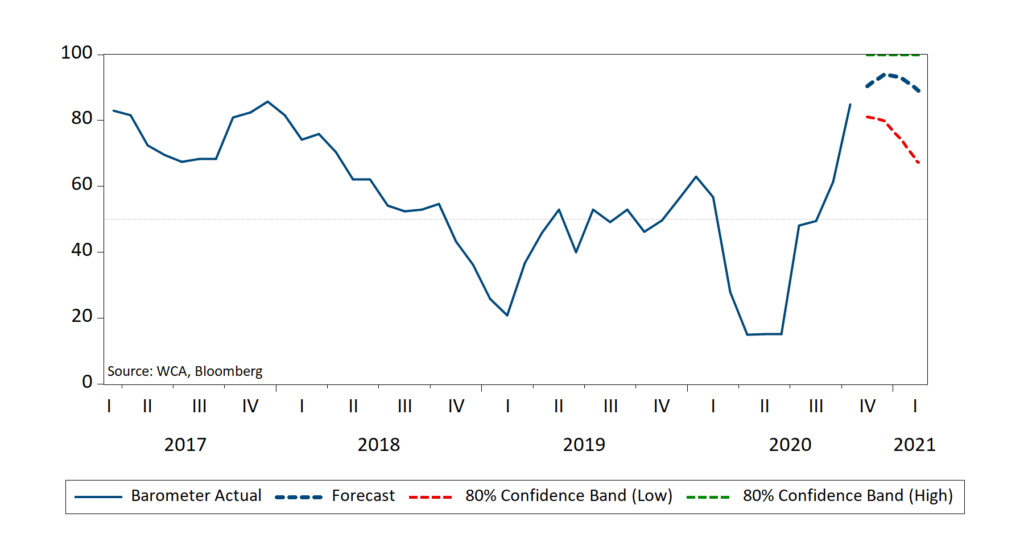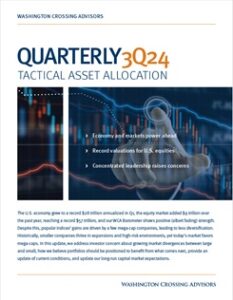Cash as a “Real Option”
In the realm of corporate finance, “real options” are those that allow managers flexibility to make decisions in the future. Instead of making all decisions upfront, managers can wait and make additional choices in the future. The assumption, of course, is that conditions could change or more information might be available then.
One of the simplest real options managers have is timing. Delaying investment in hopes of improved information in, say, a year could help improve the project’s value. The same line of thinking can be applied to allocating assets in the context of a thoughtful investment portfolio process.
Some may argue that timing investments is fraught with danger. A simple internet search will turn up all sorts of warnings against “market timing.” “Market timing” is held in low regard by many, but really shouldn’t be. All investment decisions carry some sort of risk along with potential reward. Whether decisions to invest or not to invest are done with intention or by default, a decision is still being made. The decision of whether to consciously some allow cash or disallow cash altogether is still a decision.
Value of Options
Rather than seeing cash as a lost opportunity, the “optionality” that comes from holding cash has a value. An option is the right to buy or sell something at a stated price within a set time period. The stated price is called a “strike” price, and the time period ends at “expiration.” Cash can be viewed as an option to buy any asset with no strike price or expiration. Thus it is reasonable to consider cash as having an option-like quality since it conveys rights to the holder. But, the freedom of choice that this “right” conveys is foregone once cash is spent. And, since options have value, it is essential to consider what is given up when one adopts the “Never a market timer be!” mantra.
However, putting a number to the value of cash’s “option value” can be very difficult. It may not even be possible in practice, and real options are tough to value and can vary from person to person. Still, it is also wrong to ignore the value or discount it entirely. Corporate managers know that if they are faced with two identical projects, but one project offers flexible options, the one with the options is more valuable. The value of “optionality” is well understood in corporate finance circles and should not be ignored by investors.
Three Reasons
- When a reasonably priced alternative asset can not be found after a thorough search, holding some cash can help avoid injecting cash into overvalued assets. This can help a portfolio stay within a value discipline during overheated markets.
- Flexibility to hold cash avoids sacrificing the value of the real option cash conveys. Cash allows for sequential future investment decisions rather than compulsory choices based on day one’s information.
- Maintaining freedom of choice by allowing cash also allows the possibility of enhancing portfolio value. This is done by retaining flexibility for potentially smart future decisions whenever good opportunities arise.
Personal Decision
If you worry more about missing out on a rise in the market than enduring losses from overpaying, holding cash may not be right for you. Many investors prefer to avoid holding cash. There is no shame in this perspective, and it has worked for many over the years. But, if you are willing to miss out on some of the market’s upside from time to time and care more about price paid and value, then having a place for cash in your portfolio could make good sense. Allowing some flexibility to hold cash provides the freedom to choose.
In our view, the decision to hold cash or adopt a fully-invested strategy is a personal one. Restricting investment choices to avoid cash is appropriate for some who do not have the time to commit to investing or worry about not capturing all the market upside. For others, some allowable cash levels can provide valuable flexibility, especially during market corrections. For these reasons, it might make sense to consider the role and value of cash as a real option in a portfolio, especially in an environment of ultra-low interest rates.
Addendum:
WCA Barometer Update
Each month we track incoming data through the lens of our WCA Fundamental Conditions Barometer (Chart, below). The momentum in economic and market indicators seen since the second quarter continues. As discussed in last week’s Monday Morning Minute, there has been a sustained improvement spread across a wide variety of market and other indicators. The forecast path over the near-term remains strong with an average barometer forecast reading near 80. Readings above 50 are generally considered to be more supportive of an expanding economy and positive near-term stock price movement. Accordingly, allocations to the stock component of CONQUEST tactical asset allocation portfolios have been increased to roughly 80% (of the 30% of portfolios allocated toward near-term tactical tilts).
WCA Fundamental Conditions Barometer

WCA Fundamental Conditions Barometer:
We regularly assess changes in fundamental conditions to help guide near-term asset allocation decisions. The analysis incorporates approximately 30 forward-looking indicators in categories ranging from Credit and Capital Markets to U.S. Economic Conditions and Foreign Conditions. From each category of data, we create three diffusion-style sub-indices that measure the trends in the underlying data. Sustained improvement that is spread across a wide variety of observations will produce index readings above 50 (potentially favoring stocks), while readings below 50 would indicate potential deterioration (potentially favoring bonds). The WCA Fundamental Conditions Index combines the three underlying categories into a single summary measure. This measure can be thought of as a “barometer” for changes in fundamental conditions.
Disclosures:
The Washington Crossing Advisors’ High Quality Index and Low Quality Index are objective, quantitative measures designed to identify quality in the top 1,000 U.S. companies. Ranked by fundamental factors, WCA grades companies from “A” (top quintile) to “F” (bottom quintile). Factors include debt relative to equity, asset profitability, and consistency in performance. Companies with lower debt, higher profitability, and greater consistency earn higher grades. These indices are reconstituted annually and rebalanced daily. For informational purposes only, and WCA Quality Grade indices do not reflect the performance of any WCA investment strategy.
Standard & Poor’s 500 Index (S&P 500) is a capitalization-weighted index that is generally considered representative of the U.S. large capitalization market.
The S&P 500 Equal Weight Index is the equal-weight version of the widely regarded Standard & Poor’s 500 Index, which is generally considered representative of the U.S. large capitalization market. The index has the same constituents as the capitalization-weighted S&P 500, but each company in the index is allocated a fixed weight of 0.20% at each quarterly rebalancing.
The information contained herein has been prepared from sources believed to be reliable but is not guaranteed by us and is not a complete summary or statement of all available data, nor is it considered an offer to buy or sell any securities referred to herein. Opinions expressed are subject to change without notice and do not take into account the particular investment objectives, financial situation, or needs of individual investors. There is no guarantee that the figures or opinions forecast in this report will be realized or achieved. Employees of Stifel, Nicolaus & Company, Incorporated or its affiliates may, at times, release written or oral commentary, technical analysis, or trading strategies that differ from the opinions expressed within. Past performance is no guarantee of future results. Indices are unmanaged, and you cannot invest directly in an index.
Asset allocation and diversification do not ensure a profit and may not protect against loss. There are special considerations associated with international investing, including the risk of currency fluctuations and political and economic events. Changes in market conditions or a company’s financial condition may impact a company’s ability to continue to pay dividends, and companies may also choose to discontinue dividend payments. Investing in emerging markets may involve greater risk and volatility than investing in more developed countries. Due to their narrow focus, sector-based investments typically exhibit greater volatility. Small-company stocks are typically more volatile and carry additional risks since smaller companies generally are not as well established as larger companies. Property values can fall due to environmental, economic, or other reasons, and changes in interest rates can negatively impact the performance of real estate companies. When investing in bonds, it is important to note that as interest rates rise, bond prices will fall. High-yield bonds have greater credit risk than higher-quality bonds. Bond laddering does not assure a profit or protect against loss in a declining market. The risk of loss in trading commodities and futures can be substantial. You should therefore carefully consider whether such trading is suitable for you in light of your financial condition. The high degree of leverage that is often obtainable in commodity trading can work against you as well as for you. The use of leverage can lead to large losses as well as gains. Changes in market conditions or a company’s financial condition may impact a company’s ability to continue to pay dividends, and companies may also choose to discontinue dividend payments.
All investments involve risk, including loss of principal, and there is no guarantee that investment objectives will be met. It is important to review your investment objectives, risk tolerance, and liquidity needs before choosing an investment style or manager. Equity investments are subject generally to market, market sector, market liquidity, issuer, and investment style risks, among other factors to varying degrees. Fixed Income investments are subject to market, market liquidity, issuer, investment style, interest rate, credit quality, and call risks, among other factors to varying degrees.
This commentary often expresses opinions about the direction of market, investment sector, and other trends. The opinions should not be considered predictions of future results. The information contained in this report is based on sources believed to be reliable, but is not guaranteed and not necessarily complete.
The securities discussed in this material were selected due to recent changes in the strategies. This selection criterion is not based on any measurement of performance of the underlying security.
Washington Crossing Advisors, LLC is a wholly-owned subsidiary and affiliated SEC Registered Investment Adviser of Stifel Financial Corp (NYSE: SF). Registration with the SEC implies no level of sophistication in investment management.



